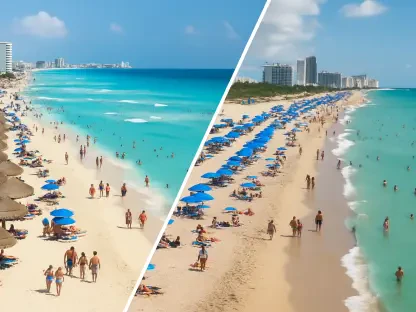Macau, often recognized as the “Las Vegas of Asia,” stands at a critical juncture as it prepares for 2026, with a forward-looking blueprint unveiled in Chief Executive Sam Hou Fai’s latest Policy Address delivered on Tuesday. This address, marking his second since assuming office, provides a comprehensive framework for the Macao Special Administrative Region (SAR) to navigate economic and social challenges while capitalizing on emerging opportunities. The strategic vision prioritizes a delicate balance between maintaining the dominance of the gaming sector and fostering growth in tourism and other industries, all while pursuing governance reforms to enhance efficiency. Amid a landscape of global uncertainties, this policy roadmap underscores a commitment to sustainable development, positioning Macau to strengthen its standing as a premier international destination. The emphasis on diversification and global outreach signals an ambitious pivot, aiming to redefine the region’s economic identity and ensure resilience against external pressures.
Economic Foundations and Oversight
Gaming Industry: Regulation and Responsibility
A cornerstone of Macau’s 2026 strategy involves a meticulous evaluation of gaming concessionaires’ investments spanning the past three years (2023-2025). This thorough review will encompass both gaming-related and non-gaming initiatives, ensuring that operators adhere to their contractual obligations and contribute meaningfully to social responsibilities. Chief Executive Sam Hou Fai highlighted the importance of aligning these efforts with the broader goal of expanding diversified tourism products, a move intended to integrate the gaming sector into a more sustainable economic model. Such oversight reflects a deliberate push to hold concessionaires accountable, ensuring their operations support Macau’s long-term vision rather than focusing solely on immediate profits. This regulatory focus aims to foster a healthier industry dynamic, balancing economic gains with societal benefits.
Beyond regulatory scrutiny, the government is encouraging gaming operators to amplify Macau’s global presence by establishing tourism promotion agencies in key international markets. This initiative seeks to leverage the networks of concessionaires to attract a wider visitor base, enhancing the region’s appeal as a top-tier destination. Markets such as Southeast Asia and beyond are targeted for these promotional efforts, building on recent moves by major operators who have already opened offices in countries like Singapore and Thailand. This outward-looking strategy is designed to boost visitor numbers and diversify revenue streams, reducing over-reliance on local or regional tourism. By fostering such international collaborations, Macau aims to solidify its reputation as a world-class hub, aligning gaming industry growth with broader tourism objectives for 2026.
Tourism as a Growth Engine
Tourism stands as a pivotal driver in the 2026 policy framework, with the innovative “tourism +” model at its core, integrating sectors such as gastronomy, events, and MICE (Meetings, Incentives, Conferences, and Exhibitions). This approach seeks to create a multifaceted visitor experience that caters to varied interests, from cultural immersion to business opportunities, thereby stimulating economic activity across multiple domains. Targeted markets include Northeast Asia, Southeast Asia, and Portuguese-speaking countries, with additional exploration into Muslim-majority regions to broaden the visitor demographic. By weaving these sectors into a cohesive tourism ecosystem, Macau aims to position itself as a dynamic destination that offers more than just gaming, appealing to a global audience with diverse preferences and expectations for travel.
To further elevate its international profile, the government plans to establish new economic, trade, tourism, and cultural offices overseas, starting with a base in Kuala Lumpur, Malaysia. Additional offices in Northeast Asia are under consideration, pending site evaluations, to strengthen outreach in high-potential regions. Collaborative efforts with China’s overseas missions will also play a crucial role in amplifying tourism promotion, leveraging diplomatic networks to enhance visibility. These strategic moves, coupled with initiatives to encourage gaming concessionaires to set up global promotion agencies, reflect a concerted effort to expand Macau’s reach and attract a steady influx of international visitors. This global outreach is poised to be a game-changer, reinforcing tourism as a sustainable engine of growth for 2026 and beyond.
Building a Diverse Economic Future
Diversification as a Core Mission
Economic diversification emerges as a non-negotiable priority in the 2026 Policy Address, described as a “mandatory task” requiring urgent and effective action. Under the “1+4” objectives, the focus is on nurturing new, internationally competitive industries to reduce Macau’s historical dependence on gaming revenue. While specific details of this framework remain broad, the overarching intent is to create a robust economic foundation resilient to global fluctuations. Enhanced policy support, increased capital investment, and the cultivation of a business-friendly environment are key mechanisms to drive this transformation. This strategic shift aims to position Macau as a hub for innovation and varied economic activity, ensuring long-term stability by balancing gaming with emerging sectors that can withstand external economic shocks.
The push for diversification also ties closely with tourism integration, as new industries are expected to complement and enhance visitor experiences. By fostering synergies across sectors, the government seeks to create a ripple effect, where growth in one area fuels progress in others, building a more interconnected economy. This approach involves identifying and supporting industries with high growth potential, ensuring they align with Macau’s unique strengths and global positioning. The commitment to diversification reflects a pragmatic recognition of the risks associated with a gaming-centric economy, especially in an era of unpredictable international trends. As Macau looks to 2026, this multi-pronged strategy is set to redefine its economic landscape, paving the way for sustainable prosperity through a broader industrial base.
Governance Reforms for Sustainable Progress
Public administration reform is another critical pillar of the 2026 vision, aimed at streamlining government operations to better support economic and social goals. Key initiatives include restructuring vital entities like the Economic and Technology Bureau and the Monetary Authority of Macao, alongside merging the Cultural Affairs Bureau, Cultural Development Fund, and Sports Bureau. These changes are designed to eliminate redundancies, improve inter-departmental coordination, and enhance overall service delivery. By modernizing governance structures, Macau’s leadership seeks to create a more agile and responsive administrative framework capable of addressing the region’s evolving needs amid rapid development and global challenges.
The emphasis on internal efficiency complements external growth strategies, ensuring that administrative reforms underpin broader economic ambitions. Such restructuring is expected to facilitate quicker decision-making and more effective implementation of policies related to tourism, diversification, and gaming oversight. While specifics on the reorganization process are limited in the address, the clear intent is to build a government apparatus that matches the pace of Macau’s aspirations for 2026. This focus on governance underscores a holistic approach, recognizing that sustainable progress requires not just economic innovation but also a robust and adaptable public sector to drive and support transformative change.
Looking Back to Move Forward
Reflecting on the 2026 Policy Address, Chief Executive Sam Hou Fai laid out a comprehensive strategy that addressed immediate economic priorities while setting a foundation for long-term resilience in Macau. The cautious approach to gaming revenue forecasts, alongside rigorous oversight of concessionaires, demonstrated a balanced perspective on the industry’s role. Meanwhile, ambitious plans to expand tourism through global outreach and the “tourism +” model showcased a vision for a more diversified visitor economy. Efforts to cultivate new industries under the diversification mandate, paired with governance reforms, highlighted a commitment to systemic stability. As Macau charts its path, the focus remains on actionable steps like establishing overseas offices and fostering international partnerships, ensuring that the momentum built can carry forward into future years with adaptability and foresight.









